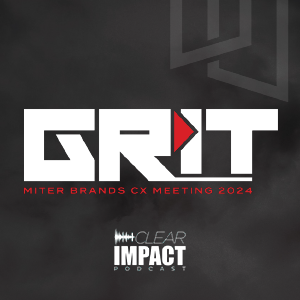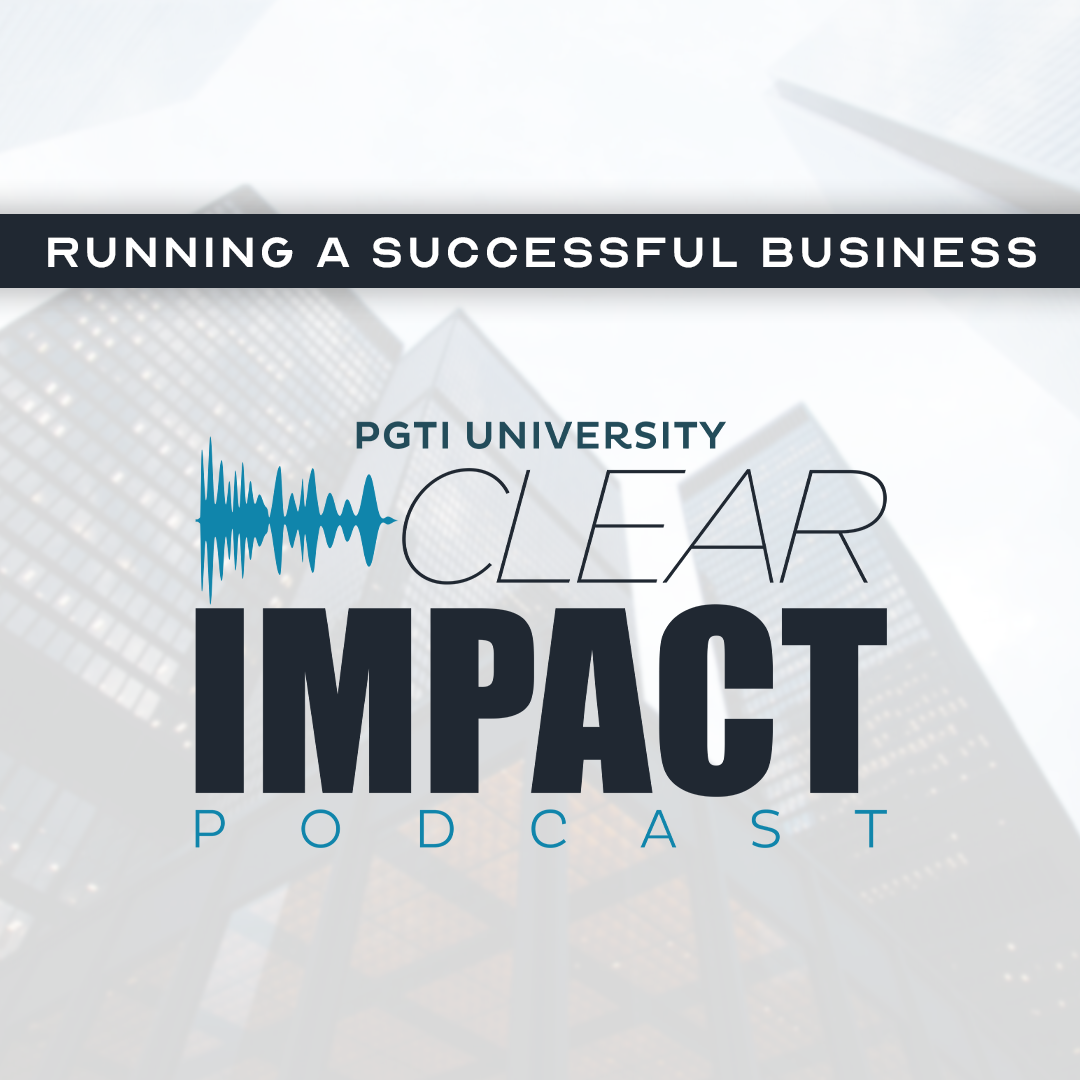Speaker 1 00:00:05 Welcome to the Clear Impact Podcast, brought to you by pg t I University. Thanks for joining us today. My name is Sherry Connor and I am your host.
Speaker 0 00:00:17 Well,
Speaker 1 00:00:17 Good morning. We are here on the Clear Impact Podcast and we are in the middle of a series called Financial Wellness. And today we have in studio Rick Tyson and Brad West. Thank you gentlemen for coming in today. Good
Speaker 2 00:00:31 Morning. Thank
Speaker 1 00:00:31 You. Glad to have you. So Brad, welcome back. For those who may not have caught the previous episode, Brad West, what is your official title
Speaker 2 00:00:38 Now? I'm the SVP of Corporate Development Treasurer, but I, my background is in finance and accounting, so I've had a lot of roles CFO controller in the past.
Speaker 1 00:00:47 Awesome. And so Rick, you are new to us. And so Rick Tyson, tell us about you. What's your role and responsibility to give us a brief overview of who you are?
Speaker 3 00:00:54 Yep. Uh, joined P G T back in 2018 as a director of fp and a. Uh, I've held various different roles within the finance function at uh, P G T. Uh, currently serve as our senior director of finance, um, very focused on reporting, budgeting, public company earnings support. I have oversight of our treasury and risk management functions and also get very involved on acquisitions with diligence and also post acquisition integrations. So, um, always plenty going on to keep us busy in a very dynamic environment.
Speaker 1 00:01:25 So what we're really doing in this series is we're trying to help our dealer audience who are essentially small business owners in how to navigate financials. And so with that, I'm grateful for the expertise that you guys bring to the table. That was kind of the idea behind the podcast is to leverage some of the really brilliant people that we have in-house and help push out some of that wisdom to the dealers and help leverage that for them. So around that, we want our small business owners, our dealers to be really successful. And so one of the things that really helps with that is obviously cash flow. So what defines a healthy cash flow?
Speaker 3 00:02:01 In my mind, I always think of something called cash conversion. Cash conversion in my mind is your free cash flow from your business divided by your EBITDA or your cash earnings from your business. EBITDA is a fancy term earnings before interest tax is depreciation amortization, but you want those two to be pretty closely aligned. When you think over 90% is probably pretty solid, but if your cash isn't moving in the direction that your earnings are moving and they're materially different, you likely have some issues that you can address to improve that performance going forward. At the core of most cash flow issues that I've seen in my career, I would say it centers around, uh, culture of disciplined execution, having great standard operating procedures, having good deposit policies, understanding how funding works with consumer financing, things like that. And also tracking, you know, various metrics on a monthly basis to see how you're performing sequentially versus prior months to see if there's any trends that you need to address. But a lot of it comes back to, I would say, very boring, disciplined execution with regards to your policies. I mean making sure you have good policies in place and if you're onboarding new employees on a regular basis, you're a growing company that's got a lot going on, things like that can fall through the cracks a little bit as well. So having great standard operating procedures and regularly talking about them, implementing them, tracking them, those types of things or what will help you improve your cash flow performance in the future.
Speaker 2 00:03:25 I can just add to that, you know what's interesting is I think sometimes we don't appreciate how much someone who focuses on those processes and making sure that the cash flow comes in according to those processes is worth 10 times, 20 times what their cost of their salary would be. If you have a cash flow struggle and you're struggling to get that cash coming in and you have someone who just focuses on that and focuses on make sure that all the processes that Rick's talking about are adhered to, the amount of cash that comes in will be infinitely higher, right then the in you're making and make sure that happens. And I think people lose sight on that cuz they just see the extra work that has to be done to put those processes in place. But ultimately what Rick's talking about is saying if you can define your processes, you can make sure you're sticking to those processes and consistently applying them, then you'll have the cash to do so much more to expand your business, to expand your geography, to make the investments you need to to
Speaker 1 00:04:24 Grow. That's
Speaker 3 00:04:25 Great. I'd say there's three key areas too that I focus on. Accounts receivable, inventory on your balance sheet and also accounts payable, how you're paying your bills, accounts receivable specifically, do you have good cash collection processes? Are you receiving paper checks? Are you doing things electronically? Are you depositing checks daily? Are you depositing checks once a week? Do you have a backup of something occurs, et cetera? Are you receiving good deposits when you're writing contracts with customers, et cetera. All very important things from an inventory standpoint. Are the inventory levels in your warehouse pretty consistent from month to month with the size of your business? Are you noticing the inventory's moving quite a bit? Whether the warehouse is more vacant one period versus more overflowing in other periods? Do you have a disciplined ordering process that you're sticking to? And then on the payable side too, how are you paying your bills? Do you have a strategy there with paying on a due date or negotiating specific terms or whatever it might be? Are you disciplined and do you have a strategy there as well? And if you're focused on those three key areas in the policies around in those, you should end up in pretty good shape from a cash flow standpoint.
Speaker 1 00:05:30 So is there an option that's best like for both of those? So two of those three things you just talked about, whether it's accounts coming in or money going out, is it better to just pay net 30? Like it's net 30 so I have another month to set on my money before I give it back to you? Is that okay? But then on the flip side of that, do you want your customers paying in net 30 or do you wait until the job's finished? Like what are some of the details around that?
Speaker 2 00:05:54 That's a very great question because I, I think there's a lot of variability amongst our dealers and our customers on exactly that, especially on the AR side. So most of our customers are obviously working with homeowners and it's an individual decision how you go about your business and what you can offer your customers. Some people may offer financing programs or some people may offer will install now and you can pay us later. But I will say this, what's most important is that when you're working with your homeowners, you need to be able to make sure that the expectations are set up front and that you follow those expectations. For instance, if it's a 50% down, let's say, and if 50% when we install the last window, if you get that 50% down and then when you saw the last window, you don't get the next 50%, two months later you're gonna be often fighting that last 50% because now all the windows and doors are installed.
Speaker 2 00:06:46 I'm not saying everybody's like that, obviously, I'm just saying that what happens is there are opportunities to make sure that you are receiving your payments from your customers and there are better times to ask for the payment than others. And that's the part of the discipline that Rick's talking about because there's a really good window in which your customers can be most excited about paying you and obviously you know what that window is and you just wanna make sure you take advantage of that. So obviously receiving the money from your customers as soon as possible is the best answer and they're definitely different options to do that and I think we're gonna talk about that in the next question. In terms of working with your vendors, you know, the whole questions are on whether you pay. Now, generally speaking, you should take advantage of the early pay discounts only because it sets you up with your vendor to be successful and also increases that EBITDA metric that Rick was talking about.
Speaker 2 00:07:34 Obviously reduces your total cost of your materials if you do that now to be able to manage that you have a, have good discipline around your cash flow and make sure that your customers are paying you on time. Mm-hmm <affirmative>, one of the things that we see with businesses and uh, you know, I'm sure there's some of our customers who occasionally in situations like this, and I realize it's not always easy, but you prefer that the money you receive for this deposit for this home is also the money that you use to pay for the windows. It's obviously that's you're buying like from us now obviously it's more fungible than that, but if you get yourself in a scenario where today's deposit pays for yesterday's order and sale, then that's how you can get in a little bit of trouble. So it's a mindset, right? The mindset is that you try to get the money as quick as possible from your customers and then use that to pay for that same material and not try to get behind.
Speaker 1 00:08:25 Be sure to tune in for upcoming episodes to help you understand the fest station industry, what you need to know when buying windows and doors and other related topics. You can find out more about
[email protected]. You can also find us on Facebook and LinkedIn. So when it comes to consumer financing, you'd give that a thumbs up.
Speaker 3 00:08:47 Uh, yeah, consumer financing is something I'm very passionate about. We see it as a really big opportunity in the marketplace, if not all dealers are using it today. There's a lot of great programs in the marketplace, whether it's for payment buyers, you know, the $99 a month, $109 a month buyer or the uh, cash buyer that maybe would appreciate 18 months, no payments, no interest, et cetera. And there's a lot of great things that go along with the financing programs in addition to those great programs, obviously low dealer fees from a profitability standpoint, you're always looking at what you're paying for those programs as a dealer sales training, you can get on the boots training at your facility to teach your team how to sell those programs better and better technology and reporting, how are you doing? How are you performing salesperson for your business, et cetera.
Speaker 3 00:09:32 And also from a cash flow perspective, there's progress pay options that are available with a lot of these banks where you can receive 50% of a contract value towards the middle of the process before an installation is complete. So you're not waiting for full payment after installation is complete at the end of the contract. So there's some really good cash flow abilities that you can take advantage of with a lot of the banks in the marketplace as well. So using that finance I think can help you increase your close rates, it can help you increase your average ticket size of what you're selling, it can help you do more with your leads, potentially spend less on advertising and overall help you as well from a cash flow standpoint with your business. So really passionate about financing programs and what's in the marketplace. And if you have any questions about any of those things, you should reach out to your sales rep at pg t and we'd love to have a chat with you. All
Speaker 1 00:10:20 Right. So around financing, I know we've had Synchrony financing, but are there other options? Are there other ways that people can tap into that or do they have to develop a relationship with a bank on their own? Or do we have something that maybe we're working on?
Speaker 3 00:10:34 Yeah, that's a great question, especially with the size of pg t i today, a billion and a half of uh, sales and a pretty large repair and remodel channel that we sell through obviously a very large opportunity for the future and talking with banks about something more exclusive with pg t i, so there could be a future where we could put something together that would be hopefully significantly better than what one of our dealers could achieve in the marketplace on their own. And that would be something we would be open to in the future.
Speaker 1 00:11:02 Okay. Yeah, I'd say that's a definite thumbs up when it comes to helping with cash flow. So just to kind of recap or however you guys wanna answer this, so what are some really key principles that are best for our dealers to follow?
Speaker 3 00:11:16 Yeah, I think we started this talking about just that culture of disciplined execution, having great policies in place, standard operating procedures, good onboarding with your new team members on those policies, tracking different metrics relating to accounts receivable, inventory, accounts payable, making sure that your cash balance is moving and in alignment with where you think your earnings are and that they're not materially different. And having a discipline process every month of checking in on those metrics and seeing if things have changed and if they have changed, uh, rolling out some action items and digging deep on getting scrappy, uh, to figure out what can be done to improve it in the future and just never letting those conversations stop, I think is
Speaker 2 00:11:54 Key. I think what Rick said makes a lot of sense and he said something there that I think was really interesting. He said, make sure your cash is growing in line with your expectations of your profit. So if any of our dealers have had this moment where, man, I feel like my financial people are telling me I make this much of a money a year, or I I'm set up to make this much money a year, I feel like my, that's what my own little analysis tells me. And your cash balance isn't growing to that level. That's literally what Rick is saying is that's when you really need to start checking out your processes, seeing what you're missing, because those are supposed to be aligned and there's a lot of different things you can do. Rick talked about a lot of them, but we are certainly here to help. And if, uh, one of those is collections from your customers, which is the one that we do, that come across a lot, and I think there's some options that we can do to, you know, with the things that Rick is working on with consumer finance, stuff like that, there are ways we can help our dealers with that. So we certainly wanna be helpful in that regard. But I thought that was the great point by Rick there.
Speaker 1 00:12:57 Well, and I liked what you said too about making sure that there's someone on their team that has the bandwidth to manage all of that and to keep an eye on it, and then that's an investment back into the health of the company.
Speaker 2 00:13:10 You'd be surprised on how much that investment pays off. Well,
Speaker 1 00:13:13 And as a small business owner, you're spending a lot of plates, right? You're responsible for sales, you're responsible for inventory, you're responsible for your workforce, you're responsible for marketing, you're responsible for your IT systems, you're responsible for everything. And so if looking at a spreadsheet and calculating out your numbers isn't your thing as a small business owner, then you need to have a really good partnership with an accountant. Thank you guys for joining me today and for giving some great information regarding Cash Flow, which helps our dealers with their financial wellness.
Speaker 2 00:13:41 Thank you for having us. Absolutely.
Speaker 1 00:13:42 All right, have a great day. PG t I University is the customer education team for an entire family of brands. We began with the original Ezb Breeze, porch and closure line, then became P G t, America's leading brand of impact resistant windows and doors. We then added cgi, CGI I C Window, Western Windows Systems, new South Windows, echo windows and doors, and lend windows and doors, and our latest acquisition Martin Garage doors. We create products built to withstand major storms, keeping people safe, secure, and prepared. Our exceptional brands give you the protection you need without compromising design or functionality. PPG t I University is here to educate you, our listener, so that you can be a more informed consumer of window and door products.


